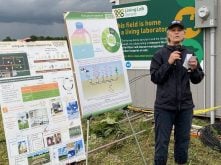The Sarnia area is set to get another bio-economy plant.
Benefuel, a producer of biodiesel, has named Sarnia as the location of its first full-scale commercial plant.
The company, based in Texas, uses a patented catalyst technology to produce low-carbon intensity biodiesel from food and agriculture waste streams.
Why it matters: The Benefuel plant will use feedstocks such as cooking oils, but also could include soybean or corn oil, providing more demand for those crops.
Benefuel’s catalyst technology, called Ensel, results in low-carbon intensity biodiesel, with high yields. The Sarnia plant will have a capacity of 75,000 litres per year.
Read Also

Canada seventh-most influential country on agri-food
Report from Dalhousie University and MNP shows Canada ranks seventh among G20 countries on agri-food influence.
Bioindustrial Innovation Canada (BIC), a not-for-profit organization based in Sarnia helping to drive bio-economy technologies toward commercialization, invested in Benefuel’s current financing round. The organization has been in discussion with Benefuel for a number of years in preparation for Benefuel’s decision to build its first commercial-scale plant in Sarnia.
Benefuel already has a test plant in operation in Kansas.
“Ontario is committed to reducing greenhouse gas emissions from its transportation fuel pool,” said Sandy Marshall, executive director of BIC. “We recognize the need for low carbon transportation fuels and Benefuel provides an important step forward to meet these goals.”
“Benefuel is excited to develop its first commercial refinery in Sarnia,” said Rob Tripp, chief executive officer of Benefuel. “After almost two years of operation of a large-scale demonstration plant in Nebraska, we are incorporating those operational learnings into an enhanced, modular refinery design that will serve as the foundation for our growth here in Sarnia and abroad.”
Tripp said that Sarnia was chosen due to its “considerable infrastructure of services, contractors, module fabricators and overall talent pool of skilled resources for operations.”
Sarnia has long been known as Ontario’s ‘chemical valley’ due to its petrochemical manufacturing base. BIC is part of the transition being made to bio-based processing, including from agriculture crops and residues.















